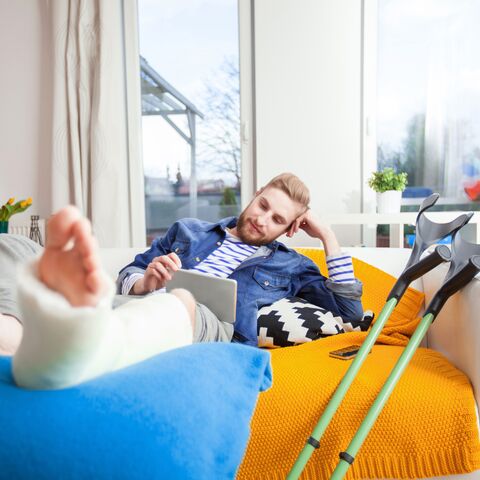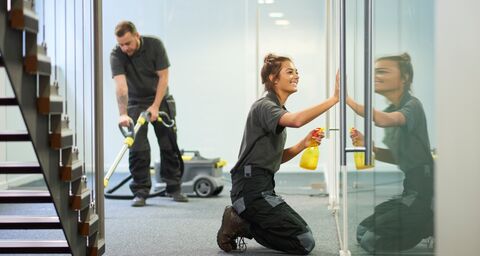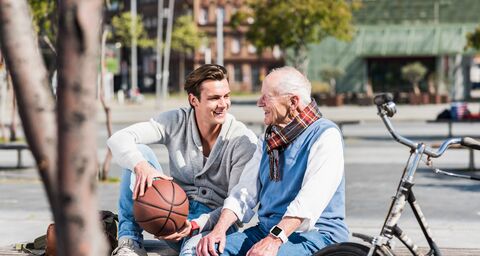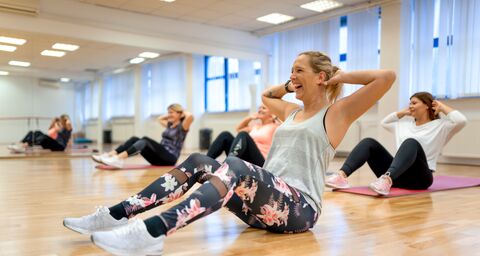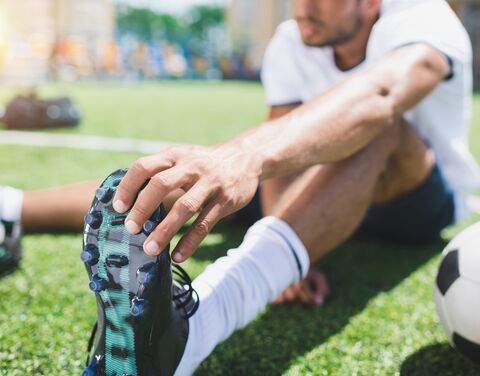
Amateur football tournament: Injury-free football
You've dribbled the ball past your opponent, you've outsmarted the opposition and now the path to goal is free. But something happens just before the ball lands in the net. Anyone taking part in an amateur football tournament these days runs the greatest injury risk of any sport. But it doesn't have to be that way: here are some prevention tips for you and your team.
Every fourth sports accident happens at a football match – around 45,000 every year, or every 11 minutes. Lack of training puts players at amateur tournaments at particular risk. Fortunately, for the most part, the injuries are not too serious – bruises, strains and sprains. They hurt, for sure, but they heal again quickly.
Soccer: a sport full of injuries
But serious consequences cannot be ruled out. It's normally the legs and feet that suffer the most during a football match. Around 50% of all injuries affect the lower limbs, the ankles and the knees. According to SUVA accident statistics, football injuries on average generated costs of CHF 200 million.
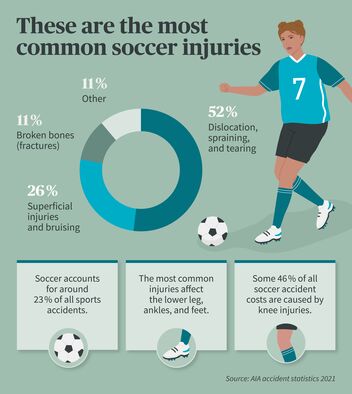
How to protect yourself against injuries at amateur tournaments
It would be easiest to use the Superstar from the Super Mario games and dribble around the pitch with immunity. Unfortunately that's not possible – and it wouldn't be in the spirit of fair play either. We've therefore teamed up with Rahel Sager, player and athletics trainer with FC Luzern Spitzenfussball Frauen, to bring you a few tips on how to prevent injuries:
- Training: Regardless of whether for conditioning or muscle building, only regular training brings success. This way, you can slowly but surely get used to the physical exertion and therefore prevent many injuries. Make sure that your team also trains together before a football match and strengthens the most important muscles. Important body areas are knees, ankles and lower legs. Training together also has another benefit, in that the team can grow together. A healthy prerequisite for the winner's podium!
- Equipment: Like other sports, there is protective equipment in football. Do what the professionals do and use shin pads with ankle protection and studded football boots. If you'd like to increase ankle stability, you can use sports tape or a bandage.
- Warming up: Even if you're injury-free, it's not a good idea to start a match without warming up. And to be honest, by kick-off, any good intentions of starting the game slowly have been brushed away. Even if everything is going well and nobody's injured during the match, your muscles will soon start to feel sore. To prevent sore muscles and injuries, you should warm up for at least ten minutes. It's a particularly good idea to do dynamic stretching: bouncing movements and moving quickly from one position to another.
- Fair play: Many accidents occur through fouls or overestimating your skills. In figures: 41 percent of all football accidents occur through collision with another player. You yourself can directly influence this by playing fair and leaving the field sooner rather than later if you feel uncomfortable or exhausted. If you feel something pulling during the match or make a movement that causes you pain, leave the pitch immediately. And respect the decisions of your fellow players if they choose to stop too.
- Stay calm: Of course the game starts to hot up and everyone wants to show their best. But as a consequence, not only does the injury risk increase, but in the heat of battle, players can quickly forget how hot it actually is. You should therefore protect yourself against the sun in hot weather whenever there's a break in play and drink lots of water or isotonic drinks. And despite water being a key component of beer, don't drink any until after the final whistle.
- Regeneration: After the game or before the game, when training or at an amateur tournament. Schedule in enough rests between training modules and drink enough water or isotonic drinks before, during and after your sporting activity. And eating the right food also helps, as this supports muscle building and ensures you don't suddenly run out of energy on the pitch.
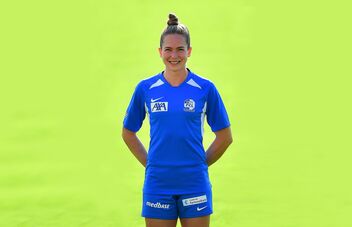
Rahel Sager, player and athletics trainer with FC Luzern Spitzenfussball Frauen with whom she won the AXA Women's Cup in 2021. Off the pitch, she studied medicine at Bern University and has been working as an assistant doctor in surgery ever since.
Tips for sore or torn muscles
Unfortunately good preparation and a great deal of experience at tournaments are still no guarantee of an injury-free game. And even minor tears can be ignored in the adrenaline rush.
A question often asked after tournaments is sore or torn muscle? In most cases, muscles stiffen up a few hours after the sporting activity, doing so rather gradually. However, cramp-like twinges during a sporting activity or when you do a particular exercise often indicate that there is a tear.
Although sore muscles per se are not a bad thing and do not leave any damage in the muscles once they've regenerated, a torn muscle or muscle fiber tear needs a lot longer to recover.
What's the best way to deal with sore muscles?
Heat and light exercise are the best way to deal with sore muscles. For example, a warm bath, a sauna or a warming balm as well as walking, jogging or cycling. However, if your muscles are very sore, it's best not to do anything for a while.
What should I do if I have a torn muscle?
With a muscle injury, joint strain or torn ligament, it's best to follow the RICE rule:
- Rest: Rest and stop doing all sporting activity immediately. Yes, even if the football tournament is in full swing. Look after your damaged muscle or the affected joint.
- Ice: Cool the damaged area with an ice pack or a cold compress. Make sure that the ice doesn't come into direct contact with the skin.
- Compression: Apply a compression bandage.
- Elevate: Elevate the injured arm or leg to prevent swelling. Even if it's already swollen, you should still elevate the affected body part to prevent further swelling.
Note: If your injury is very painful or doesn't improve after a few days, you should definitely consult a doctor.
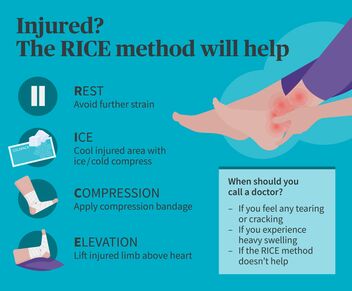
How are accidents at amateur football tournaments insured?
Accidents at amateur tournaments are covered by compulsory accident insurance or compulsory health insurance. The number of hours you work a week determines what type of insurance applies.
If you're injured by another player, then depending on the circumstances, the guilty player's personal liability insurance applies. In assessing the damage, the fact that playing football involves a certain amount of risk is taken into account, meaning that your own insurance coverage is also affected.
Gainfully employed persons
If you work more than eight hours a week, you're insured by your employer against accidents and non-occupational accidents. Here compulsory accident insurance (AIA) covers medical costs and temporary loss of income. In particularly serious cases, you're entitled to a disability pension under the AIA.
The additional costs for a semi-private or private ward in hospital or rehabilitation are only covered if your employer has taken out supplementary insurance in addition to AIA (SAI) or if you yourself have private accident insurance.
Non-gainfully employed and self-employed persons
If you're unemployed or you work less than eight hours a week, compulsory health insurance (HIA) covers the medical costs. In this instance, you're not covered for the bridging finance for potential loss of income following an accident. This has to be insured separately, such as through occupational disability insurance.
People officially registered as unemployed are automatically insured against accident and non-occupational accidents.
Anyone taking an unpaid break from work or in training can extend the insurance coverage in their current employment within 31 days for up to six months at low cost with interim accident insurance.
In short: Protection through good preparation
Are you hoping to take part in an amateur tournament in the next few weeks? Then you should start your training today at the latest. But always adjust your training to your basic condition: if you overdo things now, there's a danger that you'll be standing on the touchline at the tournament.
Also make sure that you use protective equipment and ideally play with shin pads and studded football boots before the tournament. This way, you can avoid getting blisters on your feet and you won't have to constantly adjust your shin pads on the day of the tournament.
And last but not least: be honest with yourself. Even if we'd all like to see ourselves as the next Megan Rapinoe or Lionel Messi, most of us lack a great deal, in other words the training and talent necessary to keep up with their footballing skills. Think about this when you're playing and don't overestimate yourself.
Would you like to take part in an amateur tournament? Visit the gruempi.ch for the latest dates.

